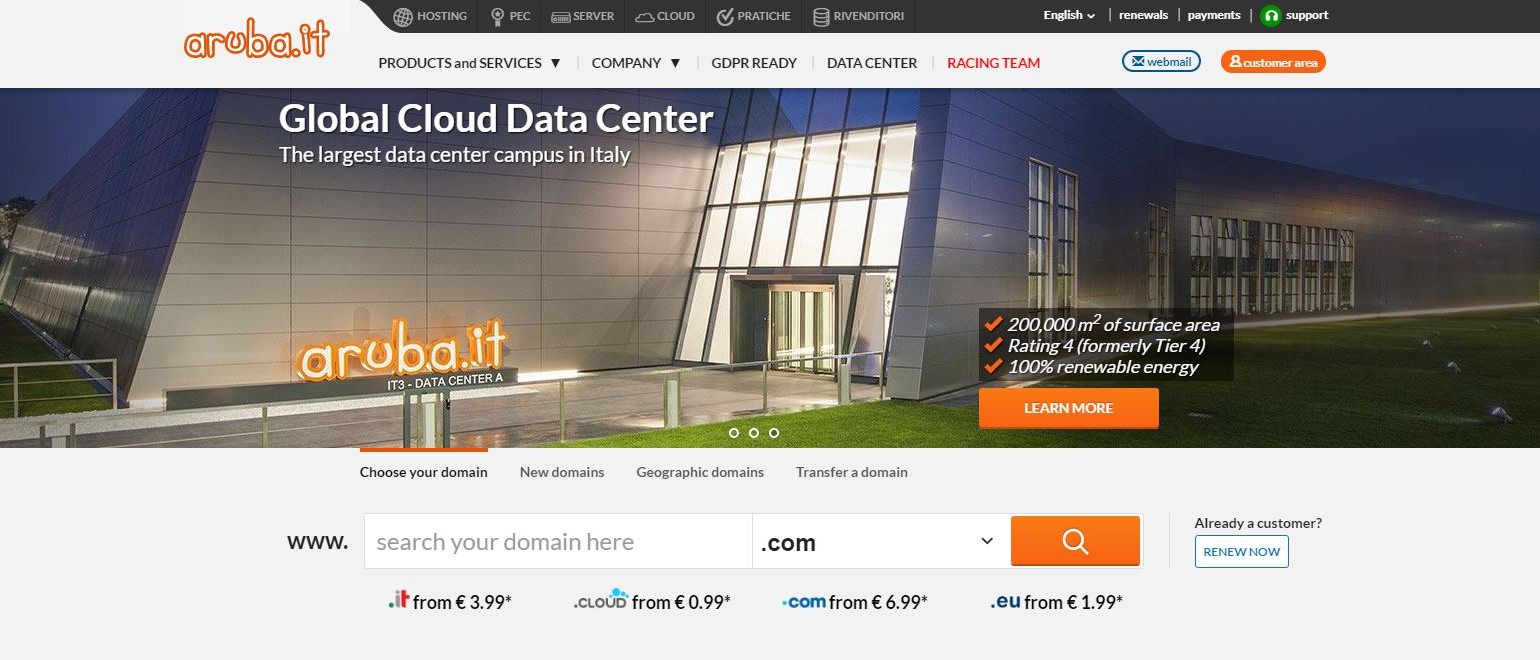TechRadar Verdict
Aruba is a decent budget-friendly hosting option, but the lack of support in English can be disappointing.
Pros
- +
Extremely cheap
- +
GDPR features
- +
Unlimited disk space and traffic
Cons
- -
Lack of reliable customer support
- -
Not everything is in English
- -
Pricing can add up
Why you can trust TechRadar
When it comes to web hosting within Europe, Aruba is a relatively popular option. Their biggest advantage is the incredibly cheap pricing - for example, you can get shared hosting for 12 euros a year - and they also offer all of the standard hosting options, a few bonuses, as well as GDPR compliance features that are especially helpful for those doing business within the EU. However, there are also significant setbacks to using their services, and whether or not you can live with those will depend on your personal needs.
- Want to try Aruba? Check out the website here
Aruba was founded in Italy back in 1994, and now has data centers in Italy, UK, France, Germany, Poland and Czech Republic. The company manages 2.7 million domains and 8.6 million email accounts, which comes up to about 5.4 million customers. Aside from web hosting, they also offer cloud solutions, PEC and trust services, the “provision and management of servers and other IT infrastructures,” as well as document delivery and recovery services in Italy.
The company also prides itself on using only 100% certified renewable energy as part of its efforts to go green. Claiming the assistance of “increase in ambitious green energy projects,” Aruba claims to have brought their carbon footprint down to zero. All of their Data Centers have been issued a Guarantee of Origin certification by the Gestore dei servizi energetici (GSE), the company behind most renewable energy efforts in Italy - and they’ve held this certification since 2013.
- We've also highlighted the best website hosting
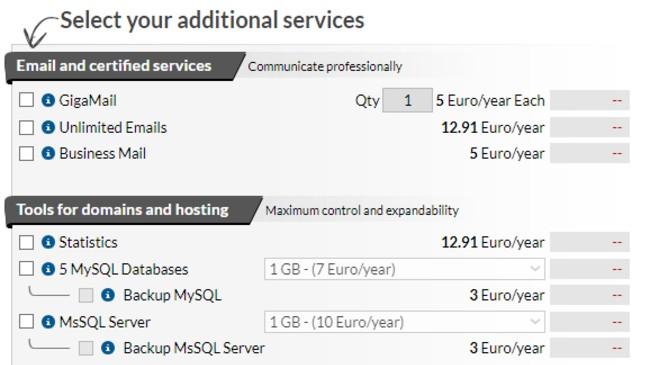
Pricing
A Linux hosting Basic plan that includes 5 custom email accounts, unlimited disk space and traffic, as well as 2Gbit/s best effort bandwidth will set you back €11.99 + VAT per year.
On the other end, the most expensive plan, the Multi Domain Cloud Hosting plan, starts at €174 per year (and goes up depending on how much RAM you choose). The only trial version you can get is 30 days for the SuperSite option. When purchasing any plan, you will be offered a number of upgrades that are not included in the initial price, so getting everything you need may turn out to be more expensive than anticipated, and you will also need to pay to have your domain registered (prices starting at €1).
You can pay for your plan by card, bank transfer, and PayPal. You can also cancel your subscription and even get your money back, but you’ll have to make a support request for that, and a reply can take a while.
Ease of use
When registering with Aruba, prepare to leave a lot of your data with them, including your ID card number, home address, and date and place of birth. The names of the countries are in Italian, so finding your home country in the drop-down list can be a bit of a chore. You will also need to either register a new domain or transfer an existing one to Aruba, unless you pay for a VPS plan. Navigating to said plan (or, really, trying to find anything in particular) is also tricky due to lack of translation, and sometimes switching from Italian to English will redirect you to a completely different page.
To build a website without any hassle at all, you can use Swite (which you’ll have to pay extra for): it draws from any linked social media accounts and updates your website. But Aruba also has a SiteBuilder where you can choose from a number of templates that you can fill in however you want, or even design your own from scratch.
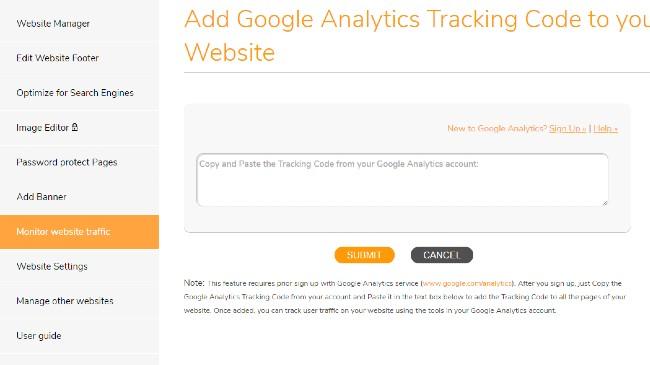
The file manager is relatively simple, making it also pretty straightforward if you know what you’re doing. But even if you don’t, using SiteBuilder lets you manage all files in a more intuitive manner, so you shouldn’t run into major problems either way. The feature has a user manual, but it seems to be completely in Italian, and we haven’t had any success in finding an English version. You can also add a Google Analytics Tracking Code to the website to monitor your traffic simply by copy-pasting it (and if you’re a complete newbie, you can’t miss the option on the left-hand side of the screen).
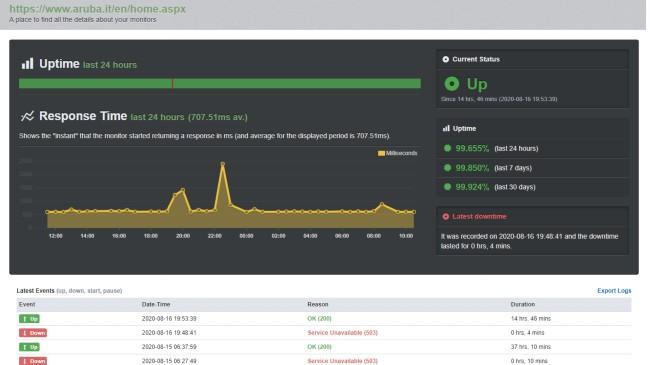
Speed and experience
Aruba’s hosting service is pretty good when it comes to speed. A GTmetrix test shows it takes 7.7 seconds for it to fully load, which is still above average (8 seconds in the case of GTmetrix compiled data). It also takes fewer requests -- 73, instead of the average 88.
Aruba’s website claims that its Data Center is Tier IV, making it top notch and claiming less than 26 minutes of annual downtime. In our test, which took place over two weeks, they already had 14 minutes total downtime, meaning it had an uptime of 99.924% during this period. Tier IV yearly uptime should be at least 99.995%, meaning Aruba, unfortunately, falls short of that mark.
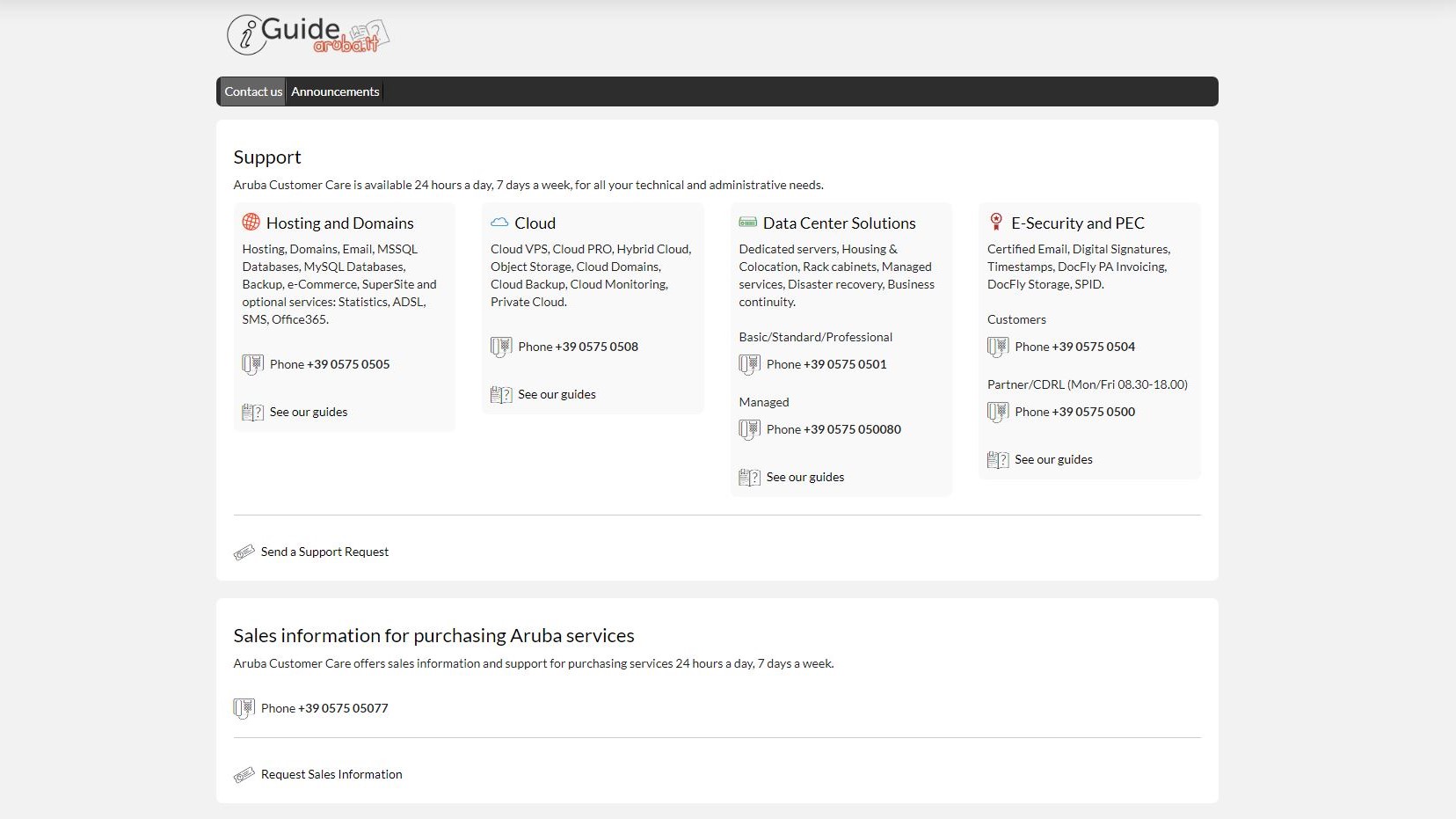
Support
Aruba’s customer service is the biggest obstacle for many customers. Although the website offers many buttons claiming 24/7 support, they all lead to a generic online contact form. There is no immediate support, like a live chat option, and the contact form is pretty slow - the best case scenario is receiving a response within 24 hours, but unfortunately, this is not guaranteed.
Another big issue is the incomplete Italian to English translation of the website. For example, they seem to have a lot of different guides that attempt to solve any problems you might run into, but that whole part of the website is in Italian, making it difficult to navigate without a translation tool (unless you know the language). There’s also a phone number available for any hosting- and domains-related questions, but if it is anything like the rest, language might again pose a barrier for many users.
The competition
Let’s take a look at Aruba’s main competitors and their similarities and differences.
The German web hosting provider Hetzner is more popular than Aruba, as it hosts almost double the number of websites. The only countries where Aruba is leading in popularity are Italy, its home country, and Tunisia, while Hetzner is the preferred option everywhere else. Still, it’s much pricier than what Aruba is offering, which gives the latter a significant advantage.
Both Hostgator and Aruba are budget-friendly options geared towards small businesses. Aruba’s biggest advantage is unlimited disk space and traffic, while Hostgator has significantly better customer support which includes a 24/7 live chat.
While Bluehost is slightly more expensive than Aruba, it includes a free domain in its price, bringing the two closer in price. The biggest difference is that the Bluehost servers are located in North America, so European customers may fare better with the local option. Another advantage of Bluehost are video guides and forum support.
HostMonster is yet another provider which beats Aruba in terms of customer support, as it has a live chat feature, a toll-free phone number for US customers, and a number of guides and how-to tutorials in English. On the other hand, Aruba is leading in terms of market share, but it’s also a decade older than its competitor, giving it a head start.
Final verdict
Aruba is a great choice for anyone interested in saving as much as they can while still getting all the standard web hosting features in one place, especially if they speak Italian. However, both Bluehost and Hostgator offer the same budget-friendly options with none of the support issues for anyone who can’t get everything they need from Aruba.
- Best overall web hosting services
- Best WordPress hosting providers
- Best e-commerce hosting
- Best dedicated server hosting
- Best small business web hosting
- Best Windows hosting services
- Best managed web hosting
- Best green web hosting
- Best business web hosting
- Best colocation hosting
- Best email hosting providers
- Best VPS hosting providers
- Best web hosting resellers

Mike is a lead security reviewer at Future, where he stress-tests VPNs, antivirus and more to find out which services are sure to keep you safe, and which are best avoided. Mike began his career as a lead software developer in the engineering world, where his creations were used by big-name companies from Rolls Royce to British Nuclear Fuels and British Aerospace. The early PC viruses caught Mike's attention, and he developed an interest in analyzing malware, and learning the low-level technical details of how Windows and network security work under the hood.
